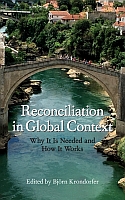Reconciliation in Global Context
Why It Is Needed and How It Works
Contributor(s)
Krondorfer, Björn (editor)
Collection
Knowledge Unlatched (KU)Number
6369Language
EnglishAbstract
When we open the newspaper, watch and listen to the news, or follow social media, we are inundated with reports on old and fresh conflict zones around the world. Less apparent, perhaps, are the many attempts at bringing former adversaries together. Reconciliation in Global Context argues for the merit of reconciliation and for the need of global conversations around this topic. The contributing scholars and scholar-practitioners—who hail from the United States, South Africa, Ireland, Israel, Zimbabwe, Germany, Palestine, Belgium, Bosnia and Herzegovina, Serbia, Switzerland, and the Netherlands—describe and analyze examples of reconciliatory practices in different national and political environments. Drawing on direct experiences with reconciliation efforts, from facilitating psychosocial intergroup workshops to critically evaluating official policies, they also reflect on the personal motivations that guide them in this field of engagement. Arranged along an arc that spans from cases describing and interpreting actual processes with groups in conflict to cases in which the conceptual merits and constraints of reconciliation are brought to the fore, the chapters ask hard questions, but also argue for a relational approach to reconciliatory practices. For, in the end, what is important is to embrace a spirit of reconciliation that avoids self-interested action and, instead, advances other-directed care.
Keywords
Political Science; PeaceDOI
10.1353/book.100028ISBN
9781438471822Publisher
State University of New York PressPublisher website
http://www.sunypress.edu/Publication date and place
2018Grantor
Imprint
SUNY PressSeries
SUNY Press Open Access,Classification
Peace studies and conflict resolution


 Download
Download